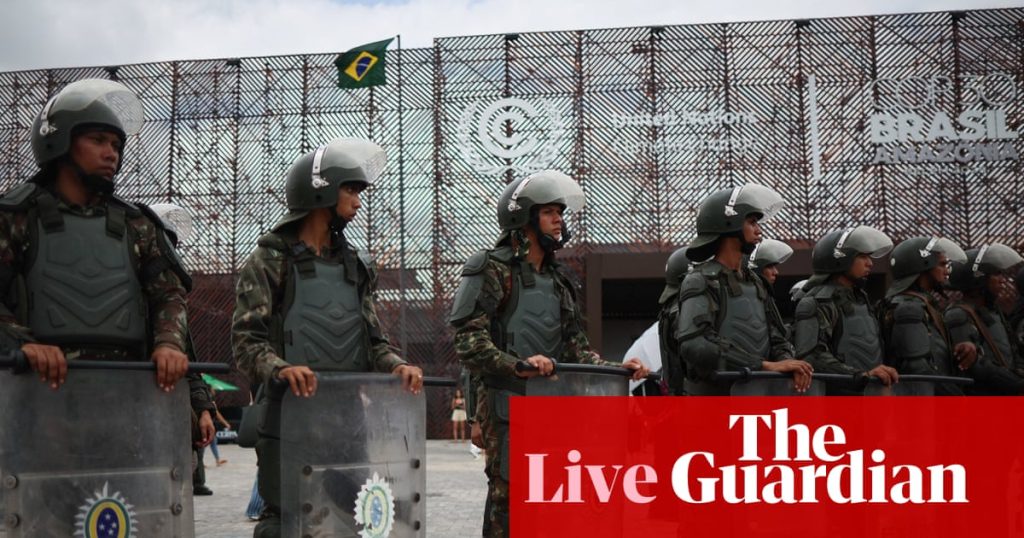Key events
Please turn on JavaScript to use this feature
Hello, Ajit Niranjan here from Berlin – I’ll be hosting the liveblog this morning and my colleague Gabrielle Canon will take over this afternoon. We’re looking forward to bringing you the latest from the Cop30 climate summit.
Share
Exclusion zone around conference expanded after protests

Damien Gayle
Walking on to Belém’s Parque da Cidade, the site of Cop30, yesterday morning revealed the extent to which the so-called “Indigenous Cop” has become a zone of exclusion for the very Indigenous people it is celebrating.
Soldiers and militarised police lined up to form human roadblocks, filtering access to the UN climate summit.
The closer you got towards the summit, the more heavily armed they became, until those closest to the venue carried shotguns and wore bandoliers of tear gas canisters. Throughout the day military helicopters buzzed ominously overhead.
Cop30 is the first in four years to be held in a democracy, but civil society groups’ hopes of being able to exercise their rights to the civic space have been increasingly disappointed.
Inside the tightly secured “blue zone”, where conference negotiations take place, the only permitted expressions of dissent were small demonstrations numbering no more than a few dozen youths politely chanting for an end to planet-killing industrialised ecocide.
And if the first Cop in four years to take place in a democracy seemed depressingly repressive business as usual on the civic space front, on the negotiations front things seemed little better.
A key issue at Cop30 – as at all recent Cops – is the issue of who pays.
Under article 9.1 of the Paris agreement, the basis for the past decade of climate negotiation, developed countries have an obligation to provide climate finance to developing countries based on their historical responsibility for carbon emissions.
This is the money that developing countries need to adapt to a rapidly warming world, and it is the money they need to respond to the climate-related disasters that it is bringing.
Developing countries want this money provided publicly by the global north. A major demand is for Cop30 to adopt a clear plan for the provision of finance implementation, including a formal process to track the progress of article 9.1.
Developed countries, particularly the UK, EU, Canada, Australia and Switzerland, have refused to engage meaningfully, say representatives of the global south.
The UK is key to unlocking this process, with Ed Miliband, the UK government’s energy and climate chance secretary, chairing the summit’s finance consultation, alongside his counterpart from the Kenyan government.
“If you can get an outcome on finance, it will unlock everything,” said Asad Rehman, chief executive of Friends of the Earth England, Wales and Northern Ireland, on the sidelines of the Cop30 negotiations on Monday.
But in common with their counterparts in the developed world, the UK government is apparently averse to any outcome that will create new commitments that could prove politically difficult domestically.
“There has been no progress on finance. They simply don’t want to talk about how the provision of finance is being implemented,” said Meena Raman, head of programmes at Third World Network.
“If we are at an ‘implementation Cop’, then money must be the central topic.”
The UK is also the main barrier to the much touted Belém Action Mechanism (Bam), the just transition framework that last week won the support of the G77 and China, collectively representing about 80% of the world’s population.
These positions expose the UK, which has in recent years presented itself as among the most ambitious of the wealthier nations when it comes to climate, as well as other European countries that have represented themselves as progressive on climate issues.
“This is the first Cop that the US aren’t here poisoning the process,” said Rehman. “Now will the UK show climate leadership?”
Share
Updated at 07.13 EST

